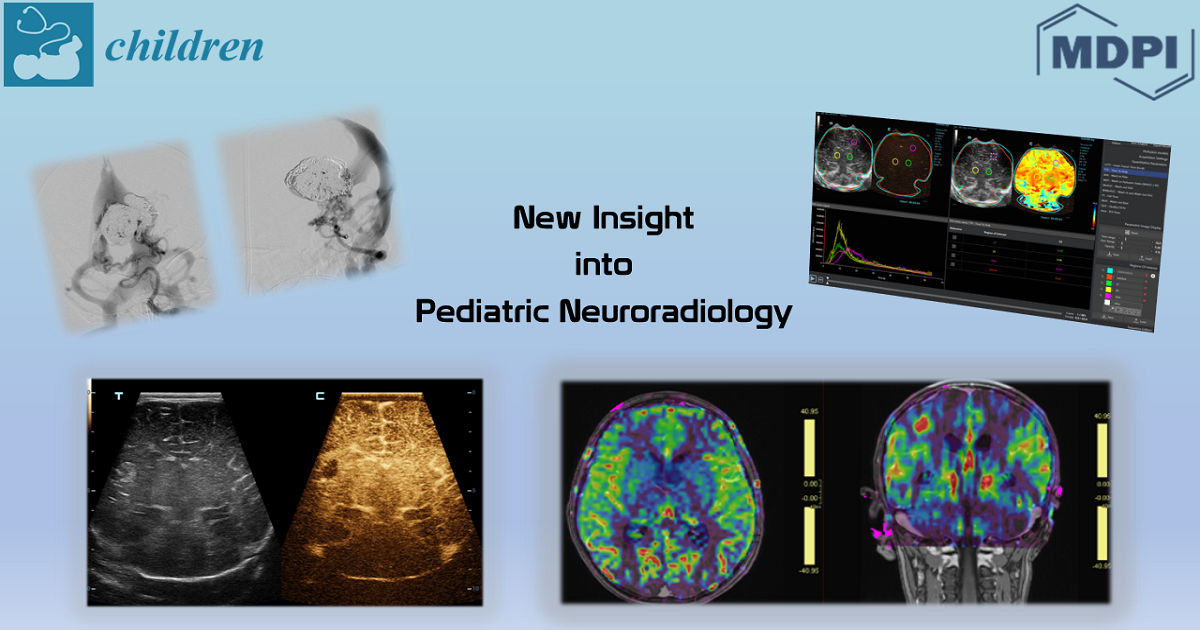New Insight into Pediatric Neuroradiology
A special issue of Children (ISSN 2227-9067). This special issue belongs to the section "Pediatric Neurology & Neurodevelopmental Disorders".
Deadline for manuscript submissions: closed (5 February 2024) | Viewed by 4516

Special Issue Editors
Interests: children; diagnostic imaging; pediatric radiology; radiography; ultrasound; magnetic resonance imaging; computed tomography
Special Issues, Collections and Topics in MDPI journals
Special Issue Information
Dear Colleagues,
Advancements of magnetic resonance imaging (MRI) technology in recent years, including imaging at higher magnetic field strengths (e.g., 7T) and the development of advanced imaging techniques such as spectroscopy, perfusion, diffusion tensor imaging (DTI), arterial spin labelling (ASL), and functional MRI (fMRI), allow earlier and more detailed recognition of pathological processes in the central nervous system in children. These advanced techniques have been proven to be useful in older children, as well as in infants and in the evaluation of the fetal brain. In addition to MRI imaging, in infants due to the open anterior fontanelle and non-ossified vertebral spinous processes, ultrasonography is a convenient and valuable tool for the evaluation of the brain and spine. Development of contrast-enhanced ultrasound (CEUS) and elastography has opened new possibilities in the field of pediatric neuroradiology using ultrasonography.
The aim of this Special Issue is to present some of the novelties and potential future diagnostic possibilities in the field of pediatric neuroradiology.
Dr. Domen Plut
Dr. Mai-Lan Ho
Guest Editors
Manuscript Submission Information
Manuscripts should be submitted online at www.mdpi.com by registering and logging in to this website. Once you are registered, click here to go to the submission form. Manuscripts can be submitted until the deadline. All submissions that pass pre-check are peer-reviewed. Accepted papers will be published continuously in the journal (as soon as accepted) and will be listed together on the special issue website. Research articles, review articles as well as short communications are invited. For planned papers, a title and short abstract (about 250 words) can be sent to the Editorial Office for assessment.
Submitted manuscripts should not have been published previously, nor be under consideration for publication elsewhere (except conference proceedings papers). All manuscripts are thoroughly refereed through a single-blind peer-review process. A guide for authors and other relevant information for submission of manuscripts is available on the Instructions for Authors page. Children is an international peer-reviewed open access monthly journal published by MDPI.
Please visit the Instructions for Authors page before submitting a manuscript. The Article Processing Charge (APC) for publication in this open access journal is 2400 CHF (Swiss Francs). Submitted papers should be well formatted and use good English. Authors may use MDPI's English editing service prior to publication or during author revisions.
Keywords
- pediatric neuroradiology
- magnetic resonance imaging
- ultrasonography
- spectroscopy
- perfusion
- arterial spin labeling
- diffusion tensor imaging
- contrast-enhanced ultrasound
- fetal brain imaging
Benefits of Publishing in a Special Issue
- Ease of navigation: Grouping papers by topic helps scholars navigate broad scope journals more efficiently.
- Greater discoverability: Special Issues support the reach and impact of scientific research. Articles in Special Issues are more discoverable and cited more frequently.
- Expansion of research network: Special Issues facilitate connections among authors, fostering scientific collaborations.
- External promotion: Articles in Special Issues are often promoted through the journal's social media, increasing their visibility.
- Reprint: MDPI Books provides the opportunity to republish successful Special Issues in book format, both online and in print.
Further information on MDPI's Special Issue policies can be found here.







